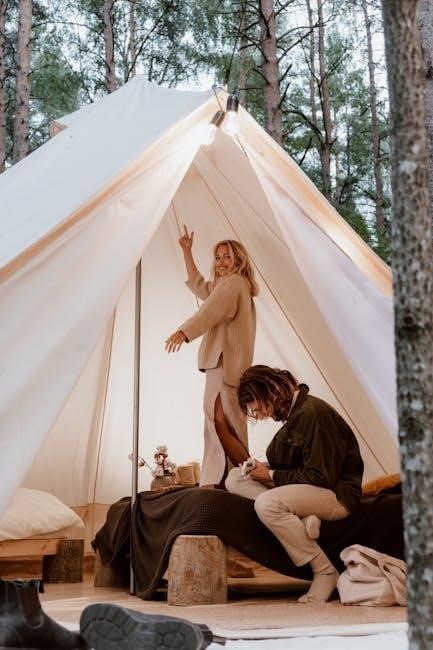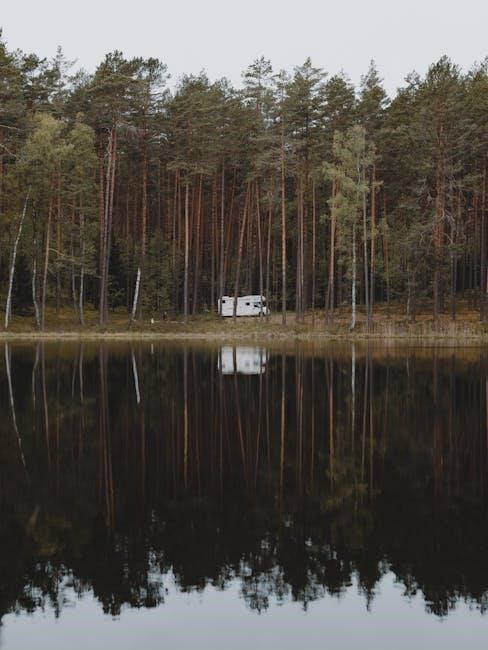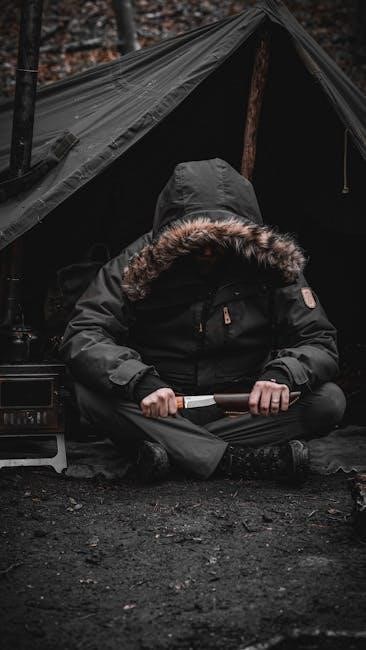Earning the Cadette Primitive Camper Badge is an exciting way for girls to develop essential outdoor skills and confidence. This badge requires planning a camping trip, preparing gear, cooking meals, learning new skills, and reflecting on the experience. It encourages teamwork, environmental stewardship, and a deeper connection with nature, helping girls become capable and adventurous leaders.
Overview of the Cadette Primitive Camper Badge
The Cadette Primitive Camper Badge is designed for girls in grades 6-8, focusing on building outdoor skills and confidence. To earn this badge, participants must plan a primitive camping trip, prepare essential gear, cook meals outdoors, and learn new primitive camping skills. The badge emphasizes teamwork, environmental stewardship, and leadership, encouraging girls to step out of their comfort zones and connect with nature. It is part of the Cadette Outdoor Journey, which also includes the Night Owl and Trailblazing badges, followed by a Take Action project. This badge helps girls develop self-reliance and a deeper appreciation for the outdoors, preparing them for future adventures and challenges.
Importance of Outdoor Skills for Cadettes
Acquiring outdoor skills is crucial for Cadettes, as it fosters independence, confidence, and a deep connection with nature. These skills, such as setting up camp, cooking outdoors, and navigating, empower girls to become self-reliant and prepared for future challenges. Outdoor experiences also promote teamwork and problem-solving, essential for leadership development. By learning to appreciate and respect the environment, Cadettes gain a sense of stewardship, encouraging them to protect natural spaces. The skills earned through the Cadette Primitive Camper Badge not only enhance personal growth but also create lifelong memories and a stronger bond with the outdoors, preparing them to take on new adventures with courage and resilience.
Structure of the Cadette Outdoor Journey
The Cadette Outdoor Journey is a comprehensive program designed to help girls build outdoor skills progressively. It consists of three badges: Night Owl, Trailblazing, and Primitive Camper, followed by a Take Action project. The journey is structured to be completed in nine meetings, with two meetings dedicated to each badge and three for the Take Action component. Girls begin by mastering basic nighttime outdoor skills with the Night Owl badge, then progress to navigating and trail skills with Trailblazing. Finally, they apply these skills in a primitive camping experience. The Take Action project encourages girls to address a community or environmental need, fostering leadership and responsibility. This structured approach ensures a gradual build-up of skills and confidence, preparing Cadettes for more complex outdoor adventures and meaningful community impact.

Planning the Primitive Camping Trip
Earning the Cadette Primitive Camper Badge requires planning a camping trip, including site selection, creating a detailed itinerary, and preparing gear for a successful outdoor experience.
Selecting a Safe and Appropriate Location
Selecting a safe and appropriate location is crucial for a successful primitive camping trip. Girls should evaluate potential sites for safety, accessibility, and environmental factors. Ensure the area is free from hazards like steep slopes or flood zones. Consider the availability of water sources and the proximity to emergency services. Choose a spot that aligns with the group’s skill level and physical abilities. Respect local regulations and protected areas to minimize environmental impact. Use topography maps or online resources to assess the terrain and weather conditions. Involving the group in the decision-making process fosters teamwork and responsibility. A well-chosen location enhances the camping experience, ensuring safety and enjoyment while promoting respect for nature.
Creating a Detailed Itinerary
Creating a detailed itinerary is essential for a well-organized primitive camping trip. Start by outlining the schedule, including arrival and departure times, camp setup, meals, and activities. Allocate specific time slots for each task to ensure everything runs smoothly. Include details like meal preparation, skill-building sessions, and downtime for relaxation. Be flexible to accommodate unexpected changes, such as weather conditions. Involve all group members in the planning process to foster teamwork and responsibility. A clear itinerary helps manage expectations, ensures safety, and maximizes the camping experience. It also serves as a guide for leaders to track progress and make necessary adjustments. A well-planned schedule enhances the overall enjoyment and success of the trip.
Assessing Weather Conditions and Safety Precautions
Assessing weather conditions and safety precautions is crucial for a successful primitive camping trip. Always check the weather forecast before departing and monitor conditions during the trip. Be prepared for unexpected changes, such as rain or extreme heat, by packing appropriate gear. Ensure all participants are aware of potential hazards and know how to respond. Safety precautions include bringing a first aid kit, flashlight, and emergency supplies. Establish clear protocols for emergencies, such as injuries or getting lost. Teach girls to identify and avoid wildlife or unstable terrain. By staying informed and prepared, you can minimize risks and ensure a safe, enjoyable experience for everyone involved. This step is essential for building confidence and responsibility in outdoor settings.
Understanding the Environmental Impact
Understanding the environmental impact is a key component of earning the Cadette Primitive Camper Badge. Girls learn to minimize their ecological footprint by practicing Leave No Trace principles, such as disposing of waste properly and avoiding sensitive habitats. They are encouraged to observe and appreciate nature without disrupting it. Teaching environmental stewardship helps girls recognize the importance of preserving natural spaces for future generations. This step fosters a deeper connection with the outdoors and promotes responsible camping practices. By understanding their impact, girls can contribute to maintaining the beauty and health of the environment while enjoying their primitive camping experience.

Preparing Gear for the Camping Trip
Essential items for primitive camping include lightweight shelter, water purification tools, and durable clothing. Packing the right gear ensures safety and comfort in the wilderness.
Essential Items for Primitive Camping
When preparing for a primitive camping trip, essential items include a sturdy tent, sleeping bag, and pad for shelter. Water purification tablets or filters ensure safe drinking water. Pack durable, layered clothing and sturdy footwear for varying conditions. A first-aid kit, flashlight, and extra batteries are crucial for emergencies. Food and cooking gear, like a portable stove or camping grill, are necessary for meal preparation. Don’t forget utensils, plates, and biodegradable soap for clean-up. A multi-tool or pocketknife can help with various tasks. Fire starters, such as matches or a ferro rod, are vital for building campfires. Remember to bring sunscreen, insect repellent, and a map for navigation. These items ensure safety, comfort, and readiness for outdoor adventures.
Packing Lightweight and Durable Equipment
Packing lightweight and durable equipment is crucial for a successful primitive camping trip. Choose gear made from high-quality, weather-resistant materials like nylon or polyester. Opt for multi-use items, such as a sarong that can serve as a blanket, towel, or shade provider. Use compression bags to reduce space and keep items dry. Select camping stoves and cookware that are compact and sturdy. Durable footwear is essential for hiking and navigating rough terrain. Avoid single-use items to minimize waste and lighten your load. By prioritizing functionality and durability, you ensure your gear withstands the elements and meets your needs without weighing you down. Proper packing enhances mobility and makes the camping experience more enjoyable.
Understanding the Use of Camping Tools and Gear
Understanding the use of camping tools and gear is vital for a successful primitive camping experience. Essential tools include a tent, sleeping bag, camping stove, and water purification equipment. Knowing how to set up a tent securely and operate a camping stove safely ensures comfort and safety. Familiarity with navigation tools like a compass and map is crucial for orienteering. Proper use of gear minimizes environmental impact and enhances teamwork. Cadettes learn to identify and use tools effectively, promoting confidence and self-reliance. This skill set is fundamental for meeting the badge requirements and fostering a deeper appreciation for outdoor adventures. Mastery of these tools empowers girls to navigate and thrive in wilderness settings, reinforcing their ability to lead and solve problems in nature.

Creating a Camp Meal Plan
Creating a camp meal plan involves planning nutritious, easy-to-prepare meals, ensuring food safety, and minimizing environmental impact, all while meeting badge requirements and fostering outdoor skills.

Meal Planning for Outdoor Adventures
For a three-day Cadette Primitive Camper Badge trip, planning balanced meals is essential. Breakfast options include instant oatmeal with dried fruits and nuts, or energy bars for quick starts. Lunches could feature non-perishable items like peanut butter and jelly sandwiches, crackers with hummus, or canned tuna with a can opener. Snacks such as trail mix, dried fruit leather, jerky, and mixed nuts provide sustained energy. Dinners might include dehydrated stews, freeze-dried meals like chicken teriyaki, or instant chili. Consider cooking methods, whether using a camping stove or building a fire, and ensure food safety with proper storage and water purification. Coordination and teamwork among participants are key to successful meal preparation and cleanup.
Preparing Nutritious and Easy-to-Cook Meals
Preparing nutritious and easy-to-cook meals is a key part of earning the Cadette Primitive Camper Badge. Focus on lightweight, non-perishable ingredients that are rich in energy and nutrients. Breakfast options like instant oatmeal with dried fruits or energy bars are ideal. For lunch, consider wraps, trail mix, and jerky. Dinners can include dehydrated meals, foil packet recipes, or one-pot dishes cooked over a camping stove or fire. Incorporate fresh fruits and vegetables when possible. Meals should be simple, requiring minimal preparation and cleanup. Encourage teamwork by assigning tasks like meal prep and cooking. Always prioritize food safety by using proper sanitation and storage methods. A well-planned menu ensures everyone stays fueled and energized throughout the camping adventure.
Food Safety and Storage in the Wilderness
Proper food safety and storage are critical during primitive camping to prevent spoilage and attracting wildlife. Use airtight, waterproof containers to store food and keep it away from camp areas. Hang food and trash bags from a tree at least 10 feet off the ground and 4 feet out from the trunk to avoid wildlife encounters. Consider using bear canisters or Ursack for added protection. Keep raw meat and dairy separate from ready-to-eat items. Wash hands frequently with biodegradable soap or use hand sanitizer. Store perishables in insulated bags with ice packs to maintain freshness. Dispose of waste properly by burying organic waste and packing out non-biodegradable items. Teach girls the importance of these practices to ensure a safe and healthy camping experience.

Learning New Primitive Camping Skills
Learning new primitive camping skills like fire starting, water purification, and navigation empowers Cadettes to thrive outdoors. These skills build confidence, teamwork, and self-reliance in nature.
Mastering Fire Starting Techniques
Mastering fire starting techniques is a fundamental skill for Cadettes earning the Primitive Camper Badge. Fire is essential for cooking, warmth, and safety in the wilderness. Cadettes learn to identify safe locations for building fires, using materials like tinder, kindling, and larger logs. They practice various methods, such as using flint and steel, matches, or friction techniques, to ignite fires. Understanding fire safety is crucial, including how to properly extinguish flames and leave no trace. This skill builds confidence and self-reliance, preparing girls to handle outdoor challenges effectively. By mastering fire starting, Cadettes develop a deeper connection with nature and enhance their ability to thrive in primitive camping environments.
Practicing Water Purification Methods
Practicing water purification methods is a critical skill for Cadettes working toward the Primitive Camper Badge. Girls learn to identify safe water sources and understand various purification techniques, such as boiling, filtration, and using purification tablets or UV light. These methods ensure access to clean drinking water in the wilderness, reducing the risk of waterborne illnesses. Cadettes also practice proper water storage to maintain hygiene and safety. Mastering these skills builds self-reliance and confidence, enabling girls to navigate outdoor environments responsibly. By understanding and applying water purification methods, Cadettes contribute to a healthier and more sustainable camping experience for themselves and their group.
Developing Navigation and Orienteering Skills
Developing navigation and orienteering skills is a key component of earning the Cadette Primitive Camper Badge. Girls learn to use maps, compasses, and natural landmarks to navigate wilderness areas confidently. These skills are essential for identifying routes, locating water sources, and finding their way back to camp. Cadettes also practice orienteering techniques, such as estimating distances and reading terrain features. By mastering these abilities, girls build self-reliance and the ability to navigate safely in remote environments. Navigation skills not only enhance camping experiences but also foster a deeper connection with nature and the confidence to explore independently. These skills are vital for any outdoor adventure and empower girls to take charge of their journeys.
Going on the Camping Trip
Executing the planned trip, Cadettes set up camp, organize gear, engage in team-building activities, and reflect on their experiences, fostering cooperation and a deeper connection with nature.
Setting Up Camp and Organizing Gear
Setting up camp is a crucial part of the primitive camping experience. Cadettes learn to choose a flat, dry area for their tent and use tarps or ground cloths for protection. Organizing gear efficiently ensures everything is accessible and secure. Girls practice arranging items like food, clothing, and tools in designated areas to maintain a tidy and functional campsite. This step teaches teamwork, problem-solving, and responsibility. Proper organization also helps prevent losses and ensures safety, especially in wilderness settings. By mastering these skills, Cadettes build confidence in their ability to thrive in outdoor environments and work collaboratively with their group.
Engaging in Team-Building Activities
Team-building activities are essential during the primitive camping trip, fostering collaboration and camaraderie among participants. Cadettes can engage in group challenges, such as setting up camp, sharing responsibilities, and solving problems together. These activities enhance communication, trust, and leadership skills, which are vital for a successful outdoor adventure. Games, nature-based scavenger hunts, and reflective discussions also encourage bonding and teamwork. By working together, girls learn to rely on each other’s strengths and support one another, creating lasting memories and a stronger sense of unity. These experiences are fundamental to the Cadette Primitive Camper Badge requirements, promoting personal growth and teamwork in a natural setting.
Reflecting on the Camping Experience
Reflecting on the camping experience is a crucial part of earning the Cadette Primitive Camper Badge. Girls are encouraged to share their thoughts and feelings about the trip, discussing challenges overcome, skills learned, and moments of joy. This reflection helps deepen their understanding of outdoor adventures and personal growth. Journaling, group discussions, or creating art inspired by the trip are effective ways to capture memories. Reflecting also allows girls to identify what they enjoyed most and how they can apply these experiences to future endeavors. By documenting their journey, Cadettes can celebrate their achievements and share insights with others, fostering a sense of accomplishment and connection to nature.

Take Action Project
Earning the Cadette Primitive Camper Badge includes a Take Action Project. Girls identify a community or environmental need, plan, and execute a meaningful initiative. They reflect on the impact of their efforts, fostering leadership and responsibility while addressing real-world issues.
Identifying a Community or Environmental Need
For the Cadette Primitive Camper Badge, girls must identify a community or environmental issue to address as part of their Take Action Project. This step encourages them to think critically about local challenges, such as park cleanup, wildlife conservation, or promoting outdoor education. They collaborate with their troop and community members to understand the problem’s scope and impact. By focusing on a specific need, girls develop a meaningful project that aligns with their skills and interests. This process fosters empathy, leadership, and a sense of responsibility, preparing them to make a positive difference in their community or environment.
Planning and Executing the Take Action Project
Once a community or environmental need is identified, Cadettes plan and execute a Take Action Project to address it. This involves setting clear goals, creating a detailed plan, and assigning roles within the troop. They gather necessary resources and collaborate with community members or organizations to ensure the project’s success. Execution requires teamwork, communication, and adaptability, as girls work together to implement their plan. Whether organizing a clean-up event, building wildlife habitats, or educating others about outdoor stewardship, the project fosters leadership and problem-solving skills. By taking actionable steps, Cadettes make a tangible impact, demonstrating their commitment to improving their community or environment while earning their Cadette Primitive Camper Badge.
Evaluating the Impact of the Project
Evaluating the impact of the Take Action Project allows Cadettes to assess the effectiveness of their efforts and understand the tangible outcomes. They gather feedback from the community or environment they aimed to improve, measuring how their actions addressed the identified need. This reflection helps identify successes and areas for improvement, fostering a deeper understanding of teamwork and leadership. By documenting their progress and results, girls can share their achievements and inspire others. Evaluating the project’s impact reinforces the value of their work and encourages continued commitment to making a positive difference, aligning with the principles of the Cadette Primitive Camper Badge and the Girl Scout mission.
Earning the Cadette Primitive Camper Badge is a rewarding experience that builds confidence, outdoor skills, and teamwork. Girls gain a sense of accomplishment and a deeper connection with nature, inspiring them to continue exploring and making a positive impact on their communities and the environment.

Final Thoughts on Earning the Badge
Earning the Cadette Primitive Camper Badge is a transformative experience that fosters confidence, teamwork, and a deep connection with nature. Girls who complete the requirements gain essential outdoor skills, from planning a trip to cooking meals in the wilderness. This badge encourages a sense of accomplishment and prepares girls to embrace future challenges with resilience. The skills learned, such as fire starting and water purification, are not only practical but also empowering. By reflecting on their journey, girls develop a greater appreciation for the environment and a commitment to stewardship. Earning this badge is more than just an achievement—it’s a stepping stone to becoming capable, adventurous, and environmentally conscious leaders.
Encouraging Others to Pursue Outdoor Adventures
Earning the Cadette Primitive Camper Badge empowers girls to inspire others to explore the outdoors. By sharing their experiences and the skills they’ve gained, they can motivate peers to embrace nature and adventure. Encourage girls to talk about their camping trips, the challenges they overcame, and the joy of connecting with the environment. They can also lead workshops or activities to teach others about camping basics, teamwork, and environmental stewardship. This ripple effect fosters a community of confident, adventurous girls who value the outdoors. By spreading their passion, they help others develop essential life skills and a lifelong love for nature, creating a lasting impact beyond their own journey.




